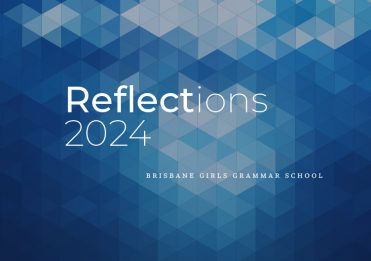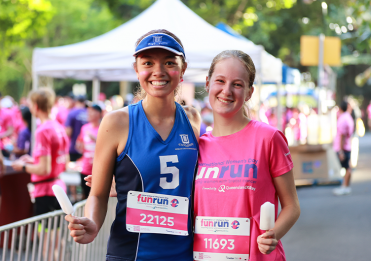Albinoni Strings video performance
Albinoni Strings were looking forward to performing Chun Dao La Sa at Open Day this year—we have, instead, recorded this video performance. This piece depicts the arrival of Spring in the mountains of Tibet. It features solo Guzheng, a traditional Chinese string instrument, performed by Queenie Tang (9O). We hope you enjoy our performance.
Jazz Ensemble and Stage Band lunchtime performance
On Tuesday 2 August at lunchtime, Jazz Ensemble and Stage Band rocked the CLC with an impromptu performance of some of their current music. The student audience loved hearing their Grammar sisters soloing and grooving their way through the lunch break. These performances were originally planned for Open Day, so we are so happy that we were able to still perform for our School community. Well done to all the students and staff involved for being so flexible. You are all stars!

Elise Castley (8B), Aliyah Woodford (8L), Grace Jackson (8M), Sophie Logan (8R), Daisy Qi (10L), Emma Wong (10W), Caitlin Crouch (8G), Alexa Giacomantonio (8H), Annabelle Abrahams (8G), Elizabeth Nash (8H) and Flora Cardell-Ree (9O)


Emily Telford (10W), Evelyn Ma (11R), Sarah Beckingsale (11L) and Mr Cavanough

Anna McAuley (11R), Matilda Goldie (12E), Chloe Brady (11M), Tahlia Haylock (9H), Ainsley Mills (9E) and Emily Telford (10W)
Celtic Ensemble performance
This week, Celtic Ensemble delighted an audience in the Annie Mackay room at lunchtime on Thursday, during Blue Day (Pyjama theme). They performed a selection of pieces including The Gael, Candles in the Dark, and Kingdom Dance from the movie Tangled.

Celtic Ensemble—Karin Sagara (7R), Chantelle Lam (7B), Jeanne Liu (9R), Grace Zhao (7L), Lauren Phua (9M), Soraya Prendergast (9W), Mary O'Brien (7L), Georgia Somerville (10G), Remi Hirayama (11L), Samara Kohn (12L), Savannah Munro (7R), Shantell Johnson (9M) and Mackenzie Somerville (10H)
Gala—Luminescence
On Sunday 14 August, Brisbane Girls Grammar School’s Instrumental Music Department will present the annual Gala Concert in the Great Hall of the Brisbane Convention and Exhibition Centre (BCEC). This year’s Gala will be the first live Gala in three years, so our entire community of staff, students, and families are incredibly excited to produce what promises to be a truly stunning Gala event.
The BCEC Great Hall has hosted some of the entertainment industry’s biggest names and we are very excited to share the space with our audience, to stage a truly remarkable and awe-inspiring concert. We will showcase some of our most gifted musicians, ensembles, and directors throughout the evening.
Luminescence will feature incredible lighting effects, state-of-the-art audio-visual experiences, and the outstanding musicianship of our students. We guarantee you will see and hear new and innovative elements you have never before experienced at any previous Gala.
Tickets for Gala—Luminescence can now be booked here.
This Saturday 6 August, we are holding a Gala rehearsal afternoon at BGGS from 2 pm to 6 pm. Students have received a memo about this. At this rehearsal, ensembles will be putting some finishing touches on their music and piecing together some of the larger combined works. We are approaching a very exciting time in the development stage of this wonderful concert event.

Gypsy Band morning tea performance
On Tuesday 2 August, Gypsy Band played on Level 3 of the CLC. In lieu of an Open Day performance, Gypsy Band decided to hold a ‘pop-up’ performance to entertain students during their morning tea break. They performed three songs featuring improvised solos: Freylachs Medley; Moliendo Café; and Joska.

Amelia Howell-Smith (9L), Aika Nishiyama (9G), Lisa Walsham (10R), Liv Evans (10O), Ellen Baek (10E), Vani Ranjan (10G) and Mia Cheng (10B)

Gypsy Band performing on CLC Level 3
From the teaching studio
This week, we introduce you to one of our new members of staff, Ms Tiffany Duncan. Ms Duncan is standing in for Mr Patterson while he is on leave. Although Ms Duncan is new to us at BGGS, she is not new to the vast world of music performance and teaching. For the last four years, Ms Duncan has worked at Beanstalk International Bilingual School in Beijing, China. It was here that Ms Duncan worked as Head of Music, teaching both classroom and Instrumental Music, while also performing with the Beijing International Chamber Orchestra. Prior to this posting, Ms Duncan worked in London for two years at Hall Mead School teaching curriculum music.
We also asked students, Aily Chang (10E), Jocelyn Lin (9G), and Ava Stafford (9R), questions about learning Instrumental Music at BGGS.
What do you feel is the most beneficial part of being involved in the Instrumental Music Department at BGGS?
Jocelyn—‘I feel like the most beneficial part is how I find the music to be challenging yet fun. When I was in primary school, I found most music I played to be incredibly simple and repetitive to learn. This led to me becoming easily bored and distracted in my rehearsals. However, after setting foot on the School’s campus, I learned that there was more to playing the violin than just rhythms and ‘proper’ bowing. I learned how to vibrato competently (with time, of course) and how to attain that rich, full sound I grew to love. I faced the challenges of switching from arco (bowing) to pizzicato (plucking the strings) quickly. One thing I struggled with prior to being involved in music at BGGS was time management. But after seeing how everyone arrived early and played to the best of their ability, I gained responsibility, which I know will greatly support me in the following years to come.’
Ava—‘Definitely building on my skills with challenging pieces that I wouldn’t usually play.’
Aily—‘Being able to play as a group and not just as an individual. Here at BGGS, we do a lot of group work, especially in the orchestra, and we really have to connect with each other to stay in time and perform well.’
Do you think you have a deeper connection with your favourite music when you’re listening to it because you have the ability to play music yourself? Could you describe that feeling?
Jocelyn—‘When I’m listening to my favourite music, I usually nod along to the beat with a smile on my face. Sometimes, I feel like I’m in the song since I have a decent grasp of rhythm and pitch because I have the ability to play multiple instruments myself. Occasionally I feel like I’m on cloud nine, floating on top of the world.’
Ava—‘Yes, for sure! It’s good because when I listen to music, I hear notes that I know I can play on the violin or piano, so I try to teach myself the songs. It’s really amazing when you are able to play songs that everyone knows and loves.’
Aily—‘Yes, I feel that I have a deeper connection with my music because I know the music and can really understand and connect to it. It’s the feeling of familiarity, that makes me feel secure and have that sense of relief.’
What do you personally find most enjoyable about playing music at BGGS?
Jocelyn—‘I find the personal connections I make the most enjoyable. When I first started here, I was shy and somewhat socially awkward. However, playing music has allowed me to open up and bond with my peers through our shared love of music. I mean, you’re bound to make some friends after hours of sitting through rehearsals attempting to synchronise your bowing.’
Ava—‘The incredible community of teachers and other students who are passionate about music.’
Aily—‘I personally find playing with other instruments, such as cello and the double bass, the most enjoyable as we can collaborate with each other and have different parts in the music and sound even better as a whole.’
We asked Ms Duncan to ponder her first few weeks with us at BGGS.
You have spent quite some time teaching overseas. Do you notice many similarities/differences between your experiences here and abroad?
‘The one thing I can say for sure about young people all over the world is that they are creative, and they love to learn. The students at this school are no exception! One of the differences I am finding is that students at BGGS have access to many opportunities to express themselves and learn in different ways under the guidance of talented and knowledgeable staff. It is great to see so many students getting involved with school curricular and co-curricular activities and making the most of the opportunities they have available.’
What has been your first impression of music tuition within the Instrumental Music Department at BGGS?
‘My first impression is that the Instrumental Music Department at BGGS is thriving. The staff and students involved in the program are talented, hard-working, and passionate about what they do. I am very excited to be involved with a large and diverse department.’
What would you like to accomplish/achieve in your time with us at BGGS?
‘In my time at BGGS, I hope to build my professional network and continue my own personal journey of lifelong learning. Teaching overseas has provided me with many unique experiences and perspectives that I hope to bring to my teaching studio and share with my students.’

Jocelyn Lin (9G), Ava Stafford (9R), Aily Chang (10E) and Ms Tiffany Duncan
Sport and Instrumental Music—similarities and differences
Sport and Instrumental Music share several similarities. However, within those similarities lies some very important and subtle differences that are important to acknowledge. In music, we often use analogies that relate to sport:
- the clarinet player’s breath in is like the tennis player’s or golfer’s backswing
- ensembles work the same way a football team works—everyone has a role within the group
- when the opposition scores or something goes wrong in the game, you don’t give up and walk off the field
- talent only takes you so far. The rest is hard work
- a sports team needs to practise repetitive drills, so do musicians.
Some of the similarities between sport and music include:
- the need to practise skills and teamwork, build endurance, and work muscles which don’t get used very often. For example, Instrumental Music students use very fine muscle groups in the fingers, face, and hands that don’t usually get used on a daily basis, and are highly specific to the instrument being played
- the use of strategies, set plays, and techniques—ensembles need to be cognitively aware of tiny changes in speed (tempo), intonation (tuning), dynamics (volume), articulation (tonguing), etc. So, both sporting and musical performance is a cognitive challenge coupled with a physical challenge at all levels of development
- focus is important in both sport and music performance, and even though there are times when players are substituted off, or are not required to play their instrument, they need to remain focused to re-enter the game/song at the precise moment they are required. We often liken the focus required for music performance to driving a car at high speed on the highway for many hours. You may just be sitting in a chair, but you are constantly making judgements, assumptions, calculations about what will/may happen next. The moment you lose concentration is the moment something can go wrong
- Sport relies very heavily on physical fitness and muscle strength, but so does music. If you were required to sit in a chair and constantly breathe deeply and exhale energetically, even for a few minutes, you would find yourself getting fatigued quite rapidly. Working the muscles of the cardio-vascular system for sustained periods of time burns a large amount of energy. You can’t see these muscles, but they are quite large and, therefore, require a great deal of strength and fitness to power them.
Though music and sport share these similar traits, there are some characteristics that differentiate the two:
- sporting teams usually have a captain who leads throughout the entire game. Music ensembles have multiple leaders who constantly change leadership roles, not just throughout a concert, but sometimes throughout a single piece of music
- both sport and music engage most of the senses (sight, hearing, touch) but music uses these in very fine detail to extract nuance and meaning out of written notes on a page. Music also requires the practitioner to access skills beyond the physical (for example, emotional and interpretive skills). It is this combination of skills that demands the musician works on multiple cognitive levels simultaneously
- many sports are seasonal, and a person can play multiple sports throughout the year. Music is for all seasons and runs consistently, on a continuum, throughout the year.
The purpose of this article is to illustrate that what many people see as a benefit of sporting participation is also a benefit of musical participation. It also shows that the demands on the musician (physical, cognitive, emotional) are considerable and must not be discounted simply because we can’t see it happening. And the prize at the end of all this work and effort is the joy of creating beautiful music for ourselves, and for our audience to appreciate.
MSG News
The next major music event is, of course, the Gala Concert on 14 August. Because the venue staff will look after ushering etc, we have no specific role except to help pack up at the end of the night. Music staff will have been on site since early morning and would love any assistance you could offer—please sign up here.
And then, mark your diaries for our inaugural Soirée on 8 October!

Looking Ahead
- Gala Rehearsal Afternoon—Saturday 6 August
- Intermediate Strings Festival—Monday 8 and Tuesday 9 August
- Gala Rehearsal Afternoon—Friday 12 August
- BGGS Gala Concert Day—Sunday 14 August
- Junior Strings Festival—Tuesday 6 and Wednesday 7 September




